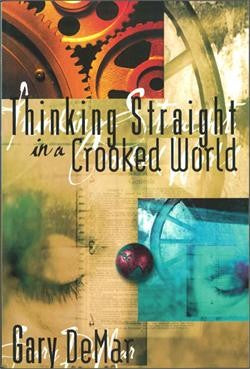If a person rejects Christianity, he has not set himself free from the concept of faith. He has only transferred his faith to something or someone else.
For Carl Sagan, the cosmos is god, a glorious accidental substitute for what he believed were ancient, pre-scientific beliefs about the deity and the origin and nature of the universe. The very idea of a personal God, in Sagan’s worldview, is simply “the dreams of men.” [1] Even so, Sagan’s worldview is fundamentally religious. Sagan’s starting point—his ultimate presupposition—evaluates all that he sees or doesn’t see in the cosmos. There is no belief more fundamental. All that follows in the Cosmos worldview is measured by his one-sentence, presuppositional yardstick: “The cosmos is all that is or ever was or ever will be.”
When Sagan excludes even the possibility that a spiritual dimension has any place in his cosmos—not even at the unknown, mysterious moment when life began—he makes accidental evolution the explanation for everything. Presented in this way, evolution does indeed look like an inverted religion, a conceptual golden calf, which manages to reek of sterile atheism. It is little wonder that many parents find their deeper emotions stirred if they discover this to be the import of Johnny’s education. [2]
While the Bible starts with, “In the beginning God” (Gen. 1:1), Sagan begins with, “In the beginning Cosmos.” Sagan worships an eternal cosmos that he presupposes is an evolutionary substitute for the eternal God of the Bible who gives life and meaning to the cosmos. Sagan says it like this: “It is the universe that made us…. We are creatures of the cosmos…. Our obligation to survive and flourish is owed, not just to ourselves, but also to that cosmos, ancient and vast, from which we spring.” [3] The primordial biotic soup nourished our ancient ancestors as they emerged from that first ocean of life. These memories, according to Sagan, are eternally etched on our evolved psyche.
The ocean calls. Some part of our being knows this is from where we came. We long to return. These aspirations are not, I think, irreverent, although they may trouble whatever gods may be. [4]
How can anyone know this? Such a belief is nothing more than a hypothesis, and not a very good one at that. This isn’t science. It borders on mysticism. Sagan makes it clear that there are no transcendent personal “gods” in his universe, only “accidents” [5] that somehow developed into design and meaning.

Thinking Straight in a Crooked World
The nursery rhyme ‘There Was a Crooked Man’ is an appropriate description of how sin affects us and our world. We live in a crooked world of ideas evaluated by crooked people. Left to our crooked nature, we can never fully understand what God has planned for us and His world. God has not left us without a corrective solution. He has given us a reliable reference point in the Bible so we can identify the crookedness and straighten it.
Buy NowOn today’s podcast, Gary discusses the modern tactic of labeling those who question climate and vaccine “science,” as “science-deniers.” Science is all about questioning and doubting and only moves forward when this happens. Science as a whole can only be done in terms of a Christian worldview, because God made an ordered and orderly world that yields results that can be predicted. This can’t happen in an evolutionary, random-chance world.
Click here for today’s episode
Click here to browse all episodes of The Gary DeMar Podcast
[1] Carl Sagan, Cosmos (New York: Random House, 1980), 257.
[2] William R. Fix, The Bone Peddlers: Selling Evolution (New York: Macmillan Publishing Co., 1984), xxiv.
[3] From the 13-hour long television presentation of Cosmos aired in the fall of 1980. Quoted in Richard A. Baer, Jr., “They Are Teaching Religion in the Public Schools,” Christianity Today (February 17, 1984), 12.
[4] Sagan, Cosmos, 5.
[5] Sagan, Cosmos, 30.

